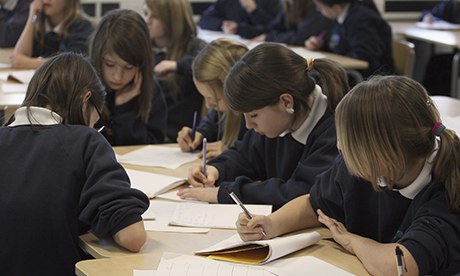Don't let dubious Pisa league tables dictate how we educate our children
Once again Britain has done badly in the international assessment of schooling. But there is more to learning than this

'One of the areas where UK children are above average is in being happy at school. Koreans are bottom of that table.' Photograph: Matt Cardy/Getty Images
The triennial results from the Programme for International Assessment(Pisa), due on Tuesday but trailed in the Sunday press, have become education's equivalent of the football World Cup. And the performance of the British teams is just as mediocre, giving more leverage to politicians determined to get a few easy cheers from slagging off teachers.
In the 2009 tests the UK was around average, with England, Scotland and Northern Ireland roughly on a par, and Wales doing even worse. The English and Scots did better than Peruvians, as you'd expect, but they were not up there with the Chinese, Singaporeans, Koreans, Japanese or Estonians and Poles. Little change this time, apparently. So much for Tony Blair's "education, education, education", for it was under his regime that the 15-year-olds who took the latest tests in maths, science and reading in 2012 got most of their schooling. Michael Govewill take that as vindication of his policies, which involve transforming everything from curriculum to ownership of schools.
The judgments of Pisa, which tests more than 500,000 pupils in 66 countries – and also looks at factors that might influence the scores such as education spending and school autonomy – are treated as authoritative and unquestionable. One of the few areas where UK children are above average is in being happy at school. Those world-class Koreans are bottom of that league table, and the Estonians and the Poles aren't far above. Gove will probably announce a national drive to raise misery standards in schools.
As they say in sport, you can't argue with the scoreboard. But in Pisa's case, we can and should. There are ample reasons not only to question whether average scores from written tests can adequately assess the quality of school systems across the planet, but also to argue that international testing regimes pose a threat to national sovereignty and cultural diversity.
For an international test to work, all students have to answer the same questions, or at least questions of similar difficulty. In one obvious sense, they don't: the questions are translated into different languages which, according to one Norwegian academic, "results in rather strange prose" in his country. Besides, "literacy" in Finnish or Korean, where words are consistently written as they are spoken, is different when compared with literacy in English.
Danish academics, when they analysed the 2006 Pisa tests, found that eight of the 28 reading questions were deleted from the final analysis in some countries. Moreover, about half the students participating that year weren't tested on reading at all. The OECD, which runs Pisa, says it calculates "plausible values" for the missing scores, and this is a Don't let dubious Pisa league tables dictate how we educate our children | Peter Wilby | Comment is free | The Guardian:

